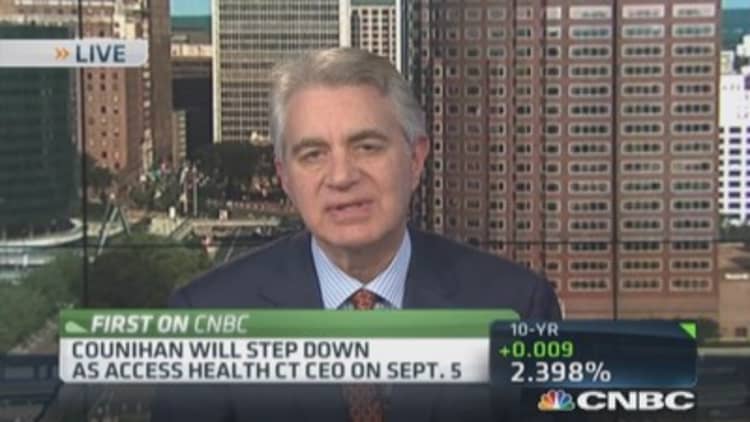Nearly 20 percent of all U.S. states are eyeing the possibility of adopting technology from Connecticut's lauded health insurance marketplace—underscoring continued serious problems at a number of Obamacare exchanges despite hundreds of millions of dollars having been spent on them to date.
The disclosure that nine states have contacted Access Health CT about possibly using its exchange platform was buried in a press release announcing the appointment of the head of that Connecticut exchange, Kevin Counihan, as CEO of HealthCare.gov, the federal Obamacare exchange that serves 36 states.
"I know of at least three that were very serious" about using Connecticut's exchange model, Access Health CT spokeswoman Kathleen Tallarita told CNBC.com. Those are part of the group of 13 other states and the District Columbia that have run their own exchanges, she said.
Tallarita said the other states that contacted Connecticut include some whose residents are currently served by HealthCare.gov—meaning those states could be looking at going off on their own and running their own exchanges as early as next year.
Read MoreCT Obamacare CEO to run HealthCare.gov
The total number of states considering a Connecticut model came as a surprise to Obamacare expert Larry Levitt, a senior vice president at the Kaiser Family Foundation.
"I didn't realize it was that many," Levitt said. "I think it shows how nervous people are about whether these systems will still work or not. There's a great political risk of running an exchange and having that technology blow up on you."
"Building this technology turned out to be a lot harder than some people thought, and you know, if you want to run an exchange, it's natural to try and grab something off the shelf that you know works," Levitt said.

By most accounts, Access Health CT worked very well, even in the first months of Obamacare open enrollment last fall when other exchanges, including HealthCare.gov, stumbled badly. Connecticut's exchange reached its target goal for enrollments in private plans four months before the close of open enrollment, and was among the top seven states in the nation when it came to signing up residents believed to be eligible for the insurance.
This success prompted Counihan to offer up the state's expertise and its technology to other states for a fee.
Connecticut's success also drew the attention of the Obama administration, which several months ago announced plans to appoint, for the first time, a dedicated CEO for HealthCare.gov. On Tuesday, officials revealed that Counihan had been tapped for the job.
Read MoreMd. Obamacare contractor subpoenaed
Maryland, whose own exchange had been a disaster, in April said it would use Connecticut's software for enrollment for the 2015 season. Counihan, at that same time, told CNBC that his exchange was in talks with four more states about them using Connecticut's model.
But in a press release Tuesday, the Health and Human Services Department revealed the number had more than doubled. "Nine states have contacted Connecticut's exchange about implementing its technology," it read.
When CNBC's "Street Signs" asked Counihan on Tuesday about those states, he said, "I really can't share the names."
"Connecticut's had some good conversations with several states, and we'll see what happens," he said, adding "We definitely believe there's a big opportunity to make this scalable."
Kaiser's Levitt said that in addition to Maryland, the obvious candidates to be talking to Connecticut are Oregon, Minnesota, Massachusetts and Hawaii—all of which experienced serious technological problems with their state-run exchanges.
Other potential candidates, he said, include some of the seven "partnership states," which are actively encouraging their residents to sign up for Obamacare plans, but whose enrollment functions are handled by HealthCare.gov. Those states are Arkansas, Delaware, Illinois, Iowa, Michigan, New Hampshire and West Virginia.
"There are a number of states that ... want to run their own exchange, but who for a variety of reasons couldn't get their act together in the first year," Levitt said.
He said those and a number of other HealthCare.gov states could end up buying Connecticut's platform if the Supreme Court eventually upholds court challenges that claim the Affordable Care Act prohibits enrollees from getting federal subsidy assistance for their premiums if they sign up via HealthCare.gov, as opposed to a state-run exchange.
Read More
Brandon Cruz, president of Web-based insurance broker GoHealth, said he wasn't particularly surprised, given the problems some states have had, that nine of them had reached out to Connecticut.
"No, that exchange was one of the most successful," said Cruz. "I'm surprised it's not 50 states that reached out," he joked. "Or not 40 states."
"People are definitely working on trying to find the best solution," Cruz added.
Any new solution comes after hundreds of millions of dollars in federal funds have been spent.
In a report issued Tuesday, the inspector general's office of HHS said that 60 contracts estimated at the time of award to be worth $1.7 billion had been obligated as of last February for the development and operation of the federal Obamacare marketplace and some services for the state-run exchanges. A number of those contracts have exceeded original estimates—sometimes to a large extent.
"For 20 of the 60 contracts, the amounts obligated through February 2014 already exceeded the estimate value of the contracts at award," the report said. "For seven of these contracts, the obligated amounts exceeded the expected value by more than 100 percent."
Cruz said that when the performance of the government-run exchanges overall is weighed against the money spent to date, "from a technology perspective, I would say there appears to be a lot of waste."
"It seems silly for every state to go out and say, we're going to build our own exchange," Cruz said.
—By CNBC's Dan Mangan


